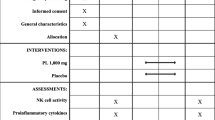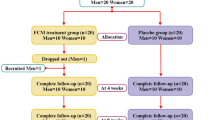Rationale
Dietary strategies to sustain descriptions of cellular immunity are often inadequately evaluated. We have tested the influence of a yeast-cells-based supplement on the blood concentration of TNF-alpha and IL-6 measured after invivo stimulation by LPS.
Methods
11 healthy subjects (5 males, 6 females, and 20 to 50 yrs) were examined before and after 4-weeks intervention with a daily 30 ml dosage of a bioactive yeast-cells preparation (Dr. Wolz Zell Immunkomplex®) in comparison with a pre-start control. Whole blood concentration of TNF-alpha and IL-6 were measured in the morning at resting and fasting conditions and after 4 hours time interval after intake of the supplement or a control drink by high sensitive ELISA methods. In addition, serum hs-CRP concentrations were analysed at all points of time.
Results
All participants completed the study without any side effects. In comparison with control, after initial intake of the supplement and after 4 four weeks of intervention the stimulated IL-6 blood concentration is slightly, but significantly reduced; in contrast to IL-6, a moderate increase in activation can be measured after 4 weeks of intervention in the stimulated TNF-alpha blood concentration. For hs-CRP values no specific changes can be found.
Conclusions
The method used objectifies significant adaptations at defined measuring times after intake of the bioactive supplement. The intake of the complex induces an adjustment of the antioxidant regulations. This modulation may be of specific interest in health care and complementary therapy of chronic degenerative diseases.
Rationales
Vorgaben, mit denen über Ernährungsansätze auf Parameter der zellulären Immunität Einfluss genommen werden sollen, sind meist nur unzureichend untersucht und über methodische Verfahren abgesichert. In der vorliegenden Studie wurde der Einfluss eines Glukan-reichen Nahrungssupplements auf Basis von Hefezellen auf die ex-vivo LPS-induzierte Stimulation von TNF-alpha und IL-6 im Vollblut beobachtet.
Methoden
Hierzu wurden 11 klinisch gesunde und normalgewichtige Personen beiderlei Geschlechts im Alter von 20 bis 50 Jahren vor und nach einer 4-wöchigen Intervention mit einem bioaktiven Supplement (morgendlicher Verzehr von 30 ml Dr. Wolz Zell Immunkomplex®) untersucht. Zur Beschreibung der Interleukinantwort im Rahmen der zellulären Immunität wurde zu 3 Untersuchungszeitpunkten (Kontrolluntersuchung, bei Interventionsbeginn, nach Intervention) vor und 4 Stunden nach Verzehr des Supplements die Konzentrationen von TNF-alpha und IL-6 im Vollblut nach erfolgter ex-vivo Stimulation mit LPS mittels hoch sensitivem ELISA-Kits gemessen. Zusätzlich wurde die Serum-hs-CRP-Konzentration im Verlauf bestimmt.
Ergebnisse
Alle Probanden beendeten die Studie ohne Beobachtung von Nebenwirkungen. Gegenüber der Kontrolluntersuchung kommt es nach dem erstmaligem Trinken wie auch nach dem Interventionszeitraum von 4 Wochen zu einer geringen, aber signifikanten Reduktion der stimulierten IL-6 Vollblut- Konzentration; anders als für IL-6 wird für die stimulierte TNF-alpha Vollblut-Konzentration nach der 4-wöchigen Intervention eine moderate Aktivierung sichtbar. Im hs-CRP können keine gerichteten Veränderungen beobachtet werden.
Schlussfolgerung
Mit der benutzten Methode ist es möglich, einen moderaten, aber zu bestimmten Zeitpunkt signifikanten Einfluss des getesteten bioaktiven Immunkomplexes auf die Vollblutstimulation der Cytokine TNF-alpha und IL-6 nachzuweisen. Der Verzehr des Supplements führt zu einer Modulation der zellulären Immunantwort bei unterschiedlicher Reaktion der beiden gemessenen Cytokine. Die nachgewiesene Wirkung wird in ihrer Bedeutung für die Gesundheitsvorsorge diskutiert.
Similar content being viewed by others

Literatur
American Dietetic Association; Dietitians of Canada; American College of Sports Medicine, Rodriguez NR, Di Marco NM, Langley S. American College of Sports Medicine position stand. Nutrition and athletic performance. Med Sci Sports Exerc. 2009;41:709–31.
Akramiene D, Kondrotas A, Didziapetriene J, Kevelaitis E.: Effects of beta-glukans on the immune system. Medicina (Kaunas) 43, 597–606 (2007)
Babu PV, Liu D.: Green tea catechins and cardiovascular health: an update. Curr Med Chem 15, 1840–50 (2008)
Berg A, König D, Halle M, Grathwohl D, Berg A, Weinstock C, Northoff H, Keul J.: Wirkung eines biologischen Kombinationspräparates auf Enzym-Hefezellbasis auf Muskelstress und Immunsystem. Dtsch Z Sportmed 48, 433–441 (1997)
Berg A, König D.: Brauchen Sportler AOV-Supplemente. Schweiz. Z. Schweiz. Z. Ernährungsmedizin 4, 26–30 (2010)
Beitz R, Mensink GB, Fischer B, Thamm M.: Vitamins-dietary intake and intake from dietary supplements in Germany. Eur J Clin Nutr 56, 539–45 (2002)
Biesalski, H-K. Antioxidative Vitamine in der Prävention Deutsches Ärzteblatt 1995; 92 A, 1316–1321
Bolcal C, Yildirim V, Doganci S, Sargin M, Aydin A, Kuralay E, Ozal E, Demirkilic U, Oz BS, Sayal A, Tatar H.: Do N-acetylcystein, betaglukan, and coenzyme Q10 mollify myocardial ischemia-reperfusion injury?. Heart Surg Forum 10, E222–7 (2007)
Chan GC, Chan WK, Sze DM.: The effects of beta-glukan on human immune and cancer cells. J Hematol Oncol 2, 25 (2009)
Dartsch P.: Health benefits of two enzyme yeast cell-based dietary supplements. Innovations in Food Technology Heft 11, 48–51 (2010)
Deibert P, König D, Berg A.: Ernährungsempfehlungen für Sporttreibende – Gesundheitsvorteile auch für die Gesamtbevölkerung?. J Ernährungsmed 7, 14–21 (2005)
Deibert P, König D, Schaffner D, Stensitzky-Thielemans A, Fink B, Berg A.: Wirkung einer Nahrungsergäung auf Basis von Enzym- Hefezellen auf den oxidativen Stress bei klinisch gesunden Normalpersonen. Sportmed präventivmed 41, 15–20 (2011)
EFSA Panel on Dietetic Products, Nutrition and Allergies (NDA). Scientific Opinion on the substantiation of health claims related to beta-glukans from oats and barley and maintenance of normal blood LDL-cholesterol concentrations (ID 1236, 1299), increase in satiety leading to a reduction in energy intake (ID 851, 852), reduction of post-prandial glycaemic responses (ID 821, 824), and “digestive function” (ID 850) pursuant to Article 13(1) of Regulation (EC) No 1924/2006. EFSA Journal 2011;9:2207.
EFSA Panel on Dietetic Products, Nutrition and Allergies (NDA). Scientific Opinion on the safety of ‘yeast beta-glukans’ as a Novel Food ingredient. EFSA Journal 2011;9:2137
EFSA Panel on Dietetic Products, Nutrition and Allergies (NDA). Scientific Opinion on the substantiation of a health claim related to Yestimun® and immune responses pursuant to Article 13(5) of Regulation (EC) No 1924/2006. EFSA Journal 2010; 8:1607.
Flynn A, Moreiras O, Stehle P, Fletcher RJ, Müller DJ, Rolland V.: Vitamins and minerals: a model for safe addition to foods. Eur J Nutr 42, 118–30 (2003)
Gorgos R, Wolz G.: Beta-Gukane und Immunsystem. Erfahrungsheilkunde 54, 638–643 (2005)
Gu Y, Fujimiya Y, Itokawa Y, Oshima M, Choi JS, Miura T, Ishida T.: Tumoricidal effects of beta-glukans: mechanisms include both antioxidant activity plus enhanced systemic and topical immunity. Nutr Cancer 60, 685–91 (2008)
Heinrich PC, Behrmann I, Haan S, Hermanns HM, Müller-Newen G, Schaper F.: Principles of interleukin (IL)-6-type cytokine signalling and its regulation. Biochem J 374, 1–20 (2003)
Hong F, Hansen RD, Yan J, Allendorf DJ, Baran JT, Ostroff GR, Ross GD.: Beta-glukan functions as an adjuvant for monoclonal antibody immunotherapy by recruiting tumoricidal granulocytes as killer cells. Cancer Res 63, 9023–31 (2003)
Kim SY, Song HJ, Lee YY, Cho KH, Roh YK: Biomedical issues of dietary fiber beta-glukan. J Korean Med Sci 21, 781–9 (2006)
Kim YS, Ke F, Zhang QY. Effect of beta-glukan on activity of antioxidant enzymes and Mx gene expression in virus infected grass carp. Fish Shellfish Immunol. 2009 Aug;27:336–40.
König D, Keul J, Northoff H, Halle M, Berg A.: Einfluß einer 6-wöchigen Intervention mit enzymaktiven Hefezellen und Antioxidantien auf Belastungsstreß und Antioxidantienstatus. Wien med Wschr 149, 13–18 (1999)
Lesage G, Bussey H.: Cell wall assembly in Saccharomyces cerevisiae. Microbiol Mol Biol Rev 70, 317–43 (2006)
Novak M, Vetvicka V.: Glukans as biological response modifiers. Endocr Metab Immune Disord Drug Targets 9, 67–75 (2009)
Rahman MM, McFadden G.: Modulation of tumor necrosis factor by microbial pathogens. PLoS Pathog 2, e4 (2006)
Ramberg JE, Nelson ED, Sinnott RA.. Immunomodulatory dietary polysaccharides: a systematic review of the literature. Nutr J. 2010 Nov 18;9:54.
Sun AY, Wang Q, Simonyi A: Sun GY. Botanical phenolics and brain health. Neuromolecular Med 10, 259–74 (2008)
Vetvicka V.: Glukan-immunostimulant, adjuvant, potential drug. World J Clin Oncol. 2, 115–9 (2011)
Weinstock C, König D, Harnischmacher R, Keul J, Berg A, Northoff H.: Effect of exhaustive exercise stress on the cytokine response. Med Sci Sports Exerc. 29, 345–54 (1997)
Williams DL.: Overview of (1–>3)-beta-D-glukan immunobiology. Mediators Inflamm. 6, 247–50 (1997)
Willment JA, Marshall AS, Reid DM, Williams DL, Wong SY, Gordon S, Brown GD.: The human beta-glukan receptor is widely expressed and functionally equivalent to murine Dectin-1 on primary cells. Eur J Immunol 35, 1539–47 (2005)
Author information
Authors and Affiliations
Corresponding author
Additional information
Influence of a yeast-cells-based supplement on cytokine stimulation
Eingegangen am 4. November 2011, angenommen am 4. November 2011
Rights and permissions
About this article
Cite this article
Berg, A., Schaffner, D., Stensitzky-Thielemans, A. et al. Wirkung einer Glukan-reichen Nahrungsergäung auf Basis von Enzym-Hefezellen auf die LPS-induzierte Cytokin-Stimulation. Sportmed Präventivmed 41, 21–25 (2011). https://doi.org/10.1007/s12534-011-0211-6
Published:
Issue Date:
DOI: https://doi.org/10.1007/s12534-011-0211-6



